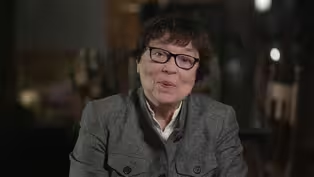
Racetrack War
Clip: Season 4 Episode 16 | 7m 39sVideo has Closed Captions
How a bitter political fight in 1937 became known as the Racetrack War.
An in-depth look at the bitter political rivalry between the governor of Rhode Island and the owner of the Narragansett Race Track in 1937. Richard Ring of the Rhode Island Historical Society tells the story of how this feud culminated in what came to be known as the Racetrack War.
Problems playing video? | Closed Captioning Feedback
Problems playing video? | Closed Captioning Feedback
Rhode Island PBS Weekly is a local public television program presented by Ocean State Media

Racetrack War
Clip: Season 4 Episode 16 | 7m 39sVideo has Closed Captions
An in-depth look at the bitter political rivalry between the governor of Rhode Island and the owner of the Narragansett Race Track in 1937. Richard Ring of the Rhode Island Historical Society tells the story of how this feud culminated in what came to be known as the Racetrack War.
Problems playing video? | Closed Captioning Feedback
How to Watch Rhode Island PBS Weekly
Rhode Island PBS Weekly is available to stream on pbs.org and the free PBS App, available on iPhone, Apple TV, Android TV, Android smartphones, Amazon Fire TV, Amazon Fire Tablet, Roku, Samsung Smart TV, and Vizio.
Providing Support for PBS.org
Learn Moreabout PBS online sponsorship- [News Anchor] Governor Quinn orders the closing of Rhode Island's famous Narragansett Racetrack and officially charges that it is a harbor for acts of violence.
Marshall Law is declared and National Guardsman take over to prevent the track's opening.
Meanwhile, opposing legislators threatened to impeach the governor for using troops.
- So the racetrack war happens in 1937, but the track itself, the Narragansett Racetrack, had been open since 1934.
And the reason that the track had opened in 1934 was really the depression.
States are looking for revenue.
And so it was a man named Walter O'Hara, who was from Fall River.
He had owned textile mills there.
He saw an opportunity, and once Governor Theodore Francis Green makes it legal to basically have parimutuel betting in Rhode Island, there's a referendum, the people vote for it, and within days, the Narragansett Racing Association is chartered, and within another few days, construction starts on the track.
And so it only takes Walter O'Hara from June to August, 1934 and $1.2 million to build an entire racetrack and the races start.
(racing bugles calling) (audience cheering) (bell ringing) That racing season lasts 59 days and $23 million is bet in that season.
The state takes $800,000 of that money and it becomes about 10% of the state's revenue.
One of the reasons that the racetrack war happens is that it's a chip, if you will, in the game, the political game that was going on at the time between the Democrats and the Republicans.
The Republicans had basically controlled the government since the Civil War.
All of that changes January 1, 1935 after Theodore Francis Green (ragtime music begins) and a group of other democratic bosses put aside their differences and essentially clean house.
All the Supreme Court justices are let go and their own people are put into place, and the power shifts completely from the Republicans to the Democrats in a matter of a week.
And then that you would think would settle the battle.
Unfortunately, the Democrats then start infighting.
The racetrack is owned by Walter O'Hara.
He allies himself with Thomas P. McCoy, who is the mayor of Pawtucket at the time.
But McCoy has his own political machine and there are maybe three other Democratic political machines at odds with each other in the state.
So the governor at the time is Robert E. Quinn, who became governor when Theodore Francis Green gets elected to the Senate.
And so Quinn is allied with the Providence Journal.
He and Sevellon Brown, the editor of the journal, are allies and McCoy and O'Hara start trying to push against Quinn and Brown, the power structure that is in the government and the friction starts.
Part of the problem is that O'Hara, as the head of the track, doesn't want to pay as many state taxes as Quinn wants, so there's a revenue issue.
And then there's always an influence issue.
O'Hara owns the Providence Star-Tribune, and he runs a particular issue with a massive headline that says, "Governor Quinn will land in Butler's," O'Hara says.
But when you folded the paper to deliver it, it just read, "Governor Quinn in Butler's."
And that was a great example of the kind of chicanery that O'Hara would pull to sort of suggest that Quinn was nuts.
Because at this point, everybody actually thinks O'Hara is kinda crazy.
Of course, he hears that and he responds in kind.
And so it's that kind of rhetorical fight that really just escalates everything.
O'Hara doesn't let Quinn's investigators come and look at the books.
Quinn sends journal reporters to the track to kind of run surveillance on O'Hara and one journal reporter gets assaulted and beaten.
There's the sense from Quinn that the track attracts elements, criminal elements.
Quinn had to remove O'Hara.
He was a loose cannon.
He was too powerful and too vocal.
So he decides that the track is now a site of insurrection.
It's a site that needs to be handled physically.
He declares martial law, sends 300 troops with machine guns and the state police and closes the track before the fall races, and is closed for about a month.
It gets national news.
Everybody is basically saying, "What in the world is happening in Rhode Island?"
It's a national embarrassment.
People are claiming that we have a little dictator overstepping his powers and basically skipping over due process.
It becomes this really contentious time.
So it ends up with O'Hara being removed.
And one of the other racing association officials, James Dooley, who is a judge, becomes the president of the Racing Association from 1938 until 1960.
So it basically gets into much saner hands.
The racetrack war wasn't a win for anyone.
It was awful sort of eruption and failure of Rhode Island politics, and it really exposed a lot of the corruption in the system.
I think that in in some ways, studying these events, especially with recent knowledge, gives us a better sense what we're dealing with today.
Five years ago, we might have looked at this story and said, "That is just crazy.
It's insane.
That could never happen now."
Really?
(violins begin playing) (violins continue playing)
Video has Closed Captions
Clip: S4 Ep16 | 8m 53s | Providence was crowned THE costume jewelry capital—now those vintage pieces are in vogue. (8m 53s)
Video has Closed Captions
Clip: S4 Ep16 | 4m 24s | Arlene Violet is worried about the fracturing of America. (4m 24s)
Providing Support for PBS.org
Learn Moreabout PBS online sponsorship
- News and Public Affairs

Top journalists deliver compelling original analysis of the hour's headlines.

- News and Public Affairs

FRONTLINE is investigative journalism that questions, explains and changes our world.












Support for PBS provided by:
Rhode Island PBS Weekly is a local public television program presented by Ocean State Media

